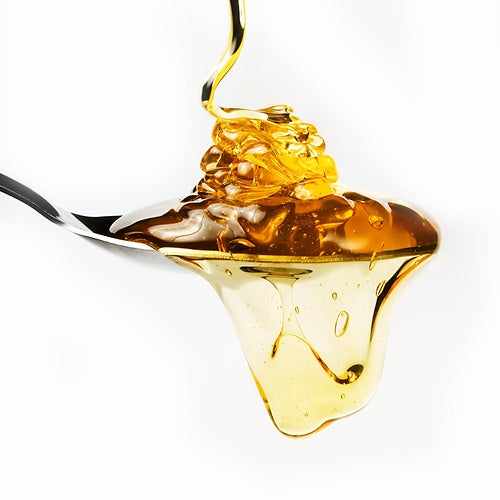Our Favorite Clean & Natural Sweeteners

Honey on spoon
“Naturally sweet foods, such as dates, berries and bananas, can be even more satisfying than a stodgy cookie,” says registered dietitian Deborah Cohen, MHSc. Many also happen to work well as clean and natural sweeteners. But, be advised, not all sweeteners are created equally.
Corn syrup converts to fat in the body in record time, while high fructose corn syrup (HFCS) – food manufacturers’ cheaper answer to sugar – may be even worse: Research has found that HFCS goes directly to the liver, releasing enzymes that tell the body to store fat, which may increase harmful triglyceride and cholesterol levels. Instead, on the right you’ll find the lowdown on five CE-approved sweeteners you can experiment with today.
Stevia
This natural powder is derived from the South American herb Stevia rebaudiana. With zero calories and a concentrated sweet kick, it’s often best used diluted in water. One half-teaspoon can equal the sweetness of one cup of refined white sugar.
Find it: Health food stores.
Raw Honey
Nature’s original sweetener contains 21 calories per teaspoon. Researchers have found that raw honey, specifically, contains probiotic bacteria that help support a healthy digestive system.
Find it: Health and organic food aisle at supermarkets and health food stores.
See Also Why You Should Avoid Artificial Sweeteners
Sucanat
A straightforward replacement for granulated sugar, it retains its molasses content, making it the closest thing to pure cane sugar. One teaspoon has 16 calories.
Find it: Health and organic food aisle at supermarkets, health food stores and wholesomesweeteners.com.
Maple Sugar Flakes
They’ve got the winning taste of pure syrup with a pleasing crunch at just seven-and-a-half calories per teaspoon – half the calories of refined sugar.
Find it: Large grocery and superstores and igourmet.com.
Organic Evaporated Cane Juice
It’s similar in appearance to sugar though a bit darker since it’s not as processed or refined. You can use it as you would white sugar, though it has a deeper molasses-like flavor.
Find it: Health food stores.
Date Sugar
Date sugar is unique in that it isn’t made from dehydrated plant juices. Rather, it’s the product of finely ground dried dates. Since it has a tendency to clump and is not water-soluble, this very sweet, minimally refined option works well in place of brown sugar. Try Chatfield’s All Natural Date Sugar.
Find it: health food stores or sites like nowfoods.com and bobsredmill.com